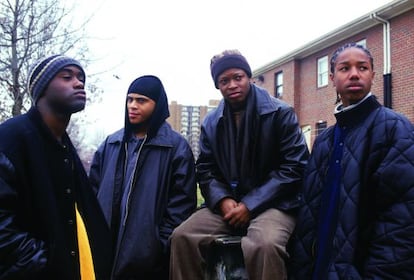David Simon: ‘They can chew you up, but then they gotta spit you out’
Recently fired by HBO for supporting the screenwriters strike, the creator of acclaimed series like ‘The Wire’, ‘Treme’ or ‘Show Me a Hero’ is a shining light in these turbulent times

Two boys from the streets play a game of checkers using chess pieces because they don’t know how to play chess. The little figures of kings, queens, rooks, bishops, knights and pawns possessing a repertoire of moves, strategies and possibilities have been turned into much more limited and simpler black and white pieces. It’s a sunny morning and the kids are standing on a Baltimore sidewalk in front of those brown brick buildings, dirty railings and clothes hanging over the street, all so typical of poor American suburbs. Then D’Angelo arrives and explains the game of chess as if he were detailing the workings of the streets and the criminal gangs that rule them. D’Angelo, a small-time boss of the West Baltimore drug trafficking organization, says: “The king is always the king.” And adds: “In this game, pawns are easily killed. They’re out of the game really fast.”
This is one of the many, and perhaps the most, iconic scenes of The Wire - David Simon’s masterpiece. Simon, creator of landmark fiction productions, was fired by HBO this week for supporting the screenwriters’ strike - who are demanding financial improvements amidst the streaming era. The director, who served as a union mediator, had been creating series for HBO for 25 years and his name was associated with the network’s immense artistic prestige. Indeed, the HBO seal of quality cannot be fully appreciated without David Simon.

The screenwriter’s list of series for the network reads magnificently: The Wire, The Corner, Generation Kill, Treme, Show Me a Hero, The Deuce, The Plot Against America, and We Own This City. These masterpieces depict, with painstaking precision and psychological and emotional depth, the flaws and failures of this mirage called the United States, a nation where no religion is more powerful and destructive than money. Simon is the greatest portrayer of American society in the 21st century. He is a conscientious powerhouse who has always known how to invert the areas of shadows and lights of American politics and economy from his cinematographic perspective.
In axing Simon, HBO has axed its leading symbol. This not only represents the end of a television era, but also the class and power struggles between bosses and workers. Simon, who was a journalist before he was a director and screenwriter, is no stranger to these instances of corporate abuse when he was involved in the union at The Baltimore Sun, the newspaper where he served as an editor and street reporter for 12 years. From there he extracted an abundance of information that he later mostly used on screen in a memorable fifth season of The Wire.
True to his principles and his television narratives, Simon embodies a message: who cares about entertainment when it comes to values, ethics and ideology? It’s all about life. The battle being fought is not one of fiction but one of reality, which is far grimmer than what we see on the screen. Neoliberalism imposes its own law, and this is exemplified by the big streaming companies such as HBO, Apple TV, Netflix and Amazon. This is happening on all fronts: labor, health, education, tourism, sports and culture. “It’s the economy, stupid,” as they say. And it is the economy and the business model of these large corporations that are against rights and collectives, against trade union organizations and labor associations. They are all intent on keeping you glued to your screens, with fictions of all kinds, social media, aspirational opportunities and distractions galore, but never with ideas, ethics, solidarity and conscience. They are not at all bothered that you are aware that you and many others like you and me form part of the very thing they want to direct and control. As John Steinbeck wrote at the time of the Great Depression in the famous novel The Grapes of Wrath: “For the quality of owning freezes you forever into ‘I’ and cuts you off forever from the ‘we’.”

Historian Howard Zinn said that the memory of states must not be accepted as our own. This could be said of the present-day reality, where the history of any country continues to conceal horrific conflicts of interest between the conquerors and the conquered, the masters and the slaves, the capitalists and the workers, the dominators and the dominated. David Simon is fully aware of this. He has chronicled it for us in his scintillating series and now, more so than ever, he symbolizes this in a single cause. For that reason, HBO’s handling of the mind that helped shape the network’s history is a grave matter. They have essentially destroyed man. To quote once again from The Grapes of Wrath, a book of tremendous relevance to today’s world: “Fear the time when Manself will not suffer and die for a concept, for this one quality is the foundation of Manself, and this one quality is man, distinctive in the universe.”
Today, more than ever, David Simon stands for a concept. In these turbulent times, he is a man who stands tall. He serves as a valuable example in the popular culture of these troubled times, where neoliberalism does not want you to know how to play chess, just like those small-time drug dealers, so that you can continue playing checkers. Just like D’Angelo, Simon is aware of the value of the figures and their movements, even if he is knocked down. As was the detective Jimmy McNulty in The Wire, who always confronted bullies and sought justice in the kingdom of the dollar, who left us with a phrase that should be spray-painted on the wall: “They can chew you up, but then they gotta spit you out.”
Sign up for our weekly newsletter to get more English-language news coverage from EL PAÍS USA Edition
Tu suscripción se está usando en otro dispositivo
¿Quieres añadir otro usuario a tu suscripción?
Si continúas leyendo en este dispositivo, no se podrá leer en el otro.
FlechaTu suscripción se está usando en otro dispositivo y solo puedes acceder a EL PAÍS desde un dispositivo a la vez.
Si quieres compartir tu cuenta, cambia tu suscripción a la modalidad Premium, así podrás añadir otro usuario. Cada uno accederá con su propia cuenta de email, lo que os permitirá personalizar vuestra experiencia en EL PAÍS.
¿Tienes una suscripción de empresa? Accede aquí para contratar más cuentas.
En el caso de no saber quién está usando tu cuenta, te recomendamos cambiar tu contraseña aquí.
Si decides continuar compartiendo tu cuenta, este mensaje se mostrará en tu dispositivo y en el de la otra persona que está usando tu cuenta de forma indefinida, afectando a tu experiencia de lectura. Puedes consultar aquí los términos y condiciones de la suscripción digital.









































